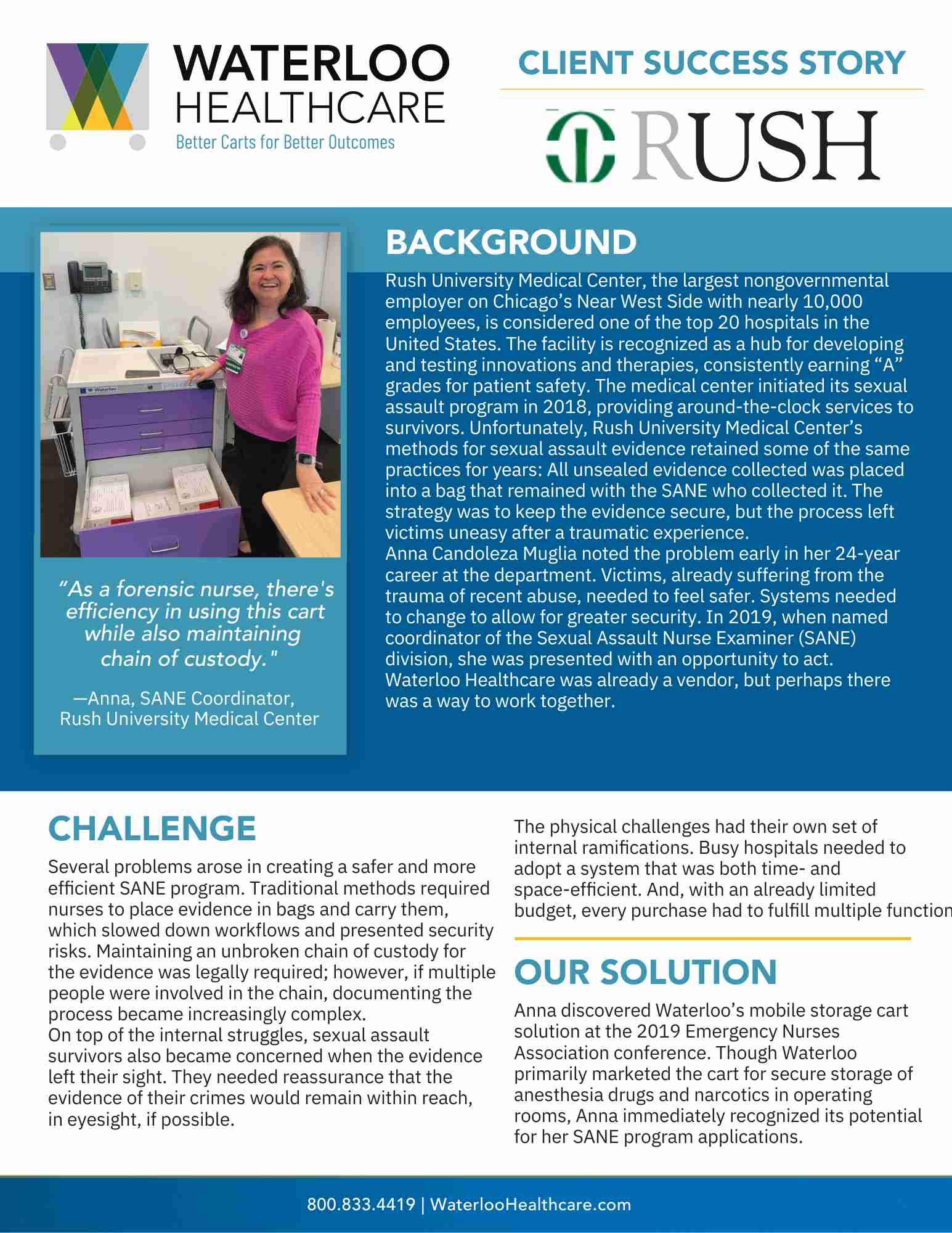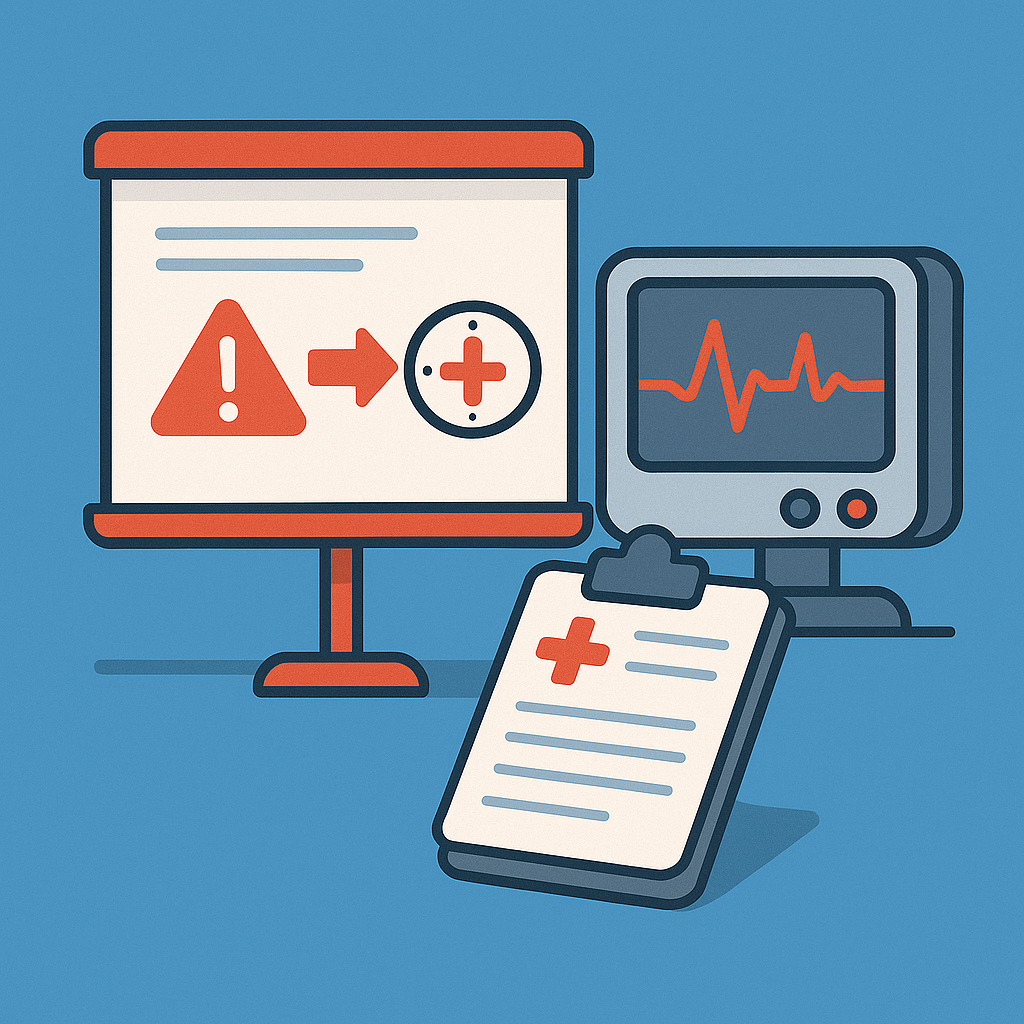Waterloo Healthcare Newsletter – September 2025
Controlled Substance Locks, Fall Conferences, and More Great Information

In this newsletter, we unravel the critical importance of controlled substance locks on procedure carts and share essential maintenance tips for cleaning medical carts. We’ll also unpack the evolution of healthcare emergency response systems.
We are proud to announce that we are partnering with Eleanor Slater Hospital in Rhode Island to support patient care initiatives – See the picture and read more about it below.
This fall, we’re excited to participate in several conferences, starting with Emergency Nursing 2025 in New Orleans (September 17-20). You’ll also find us at the OR Manager conference in Anaheim, CA, (October 28-30) and the North Carolina ENA conference in Asheville, NC (November 6-7) – Stop by, say hi, and see our carts up close.
As always, we’re thrilled to have you along for the ride, and our team continues to seek to provide high-quality medical care solutions tailored to every need.
Warm regards,

The Value of Controlled Substance Locks on Procedure Carts in Medical Facilities
In modern healthcare, where patient outcomes, staff accountability, and regulatory compliance must coexist seamlessly, storing and handling narcotics is one of the most sensitive responsibilities. Procedure carts—used in operating rooms, emergency departments, and specialty care units—often contain medications that are not only essential for patient treatment but also highly vulnerable to misuse. Narcotics—such as opioids, benzodiazepines, and other controlled substances—are both lifesaving and tightly regulated. Without proper safeguards, they present risks beyond patient care into legal, financial, and reputational consequences for the institution.
One of the most effective safeguards is equipping procedure carts with controlled substance locks. These specialized locking mechanisms, including electronic access controls, biometric scanners, or advanced key systems, ensure that only authorized personnel can access narcotics. Their value extends across four major dimensions: patient safety, regulatory compliance, staff accountability, and workflow efficiency.
Safeguarding Patients and Preventing Diversion
The most obvious and immediate benefit of controlled substance locks is the prevention of drug diversion. Diversion occurs when narcotics are misappropriated for non-medical use, whether by staff, patients, or visitors. Even a single diversion incident can have far-reaching consequences: Patients may be left undertreated for pain, medication records may be falsified, and the integrity of the care environment would be compromised.
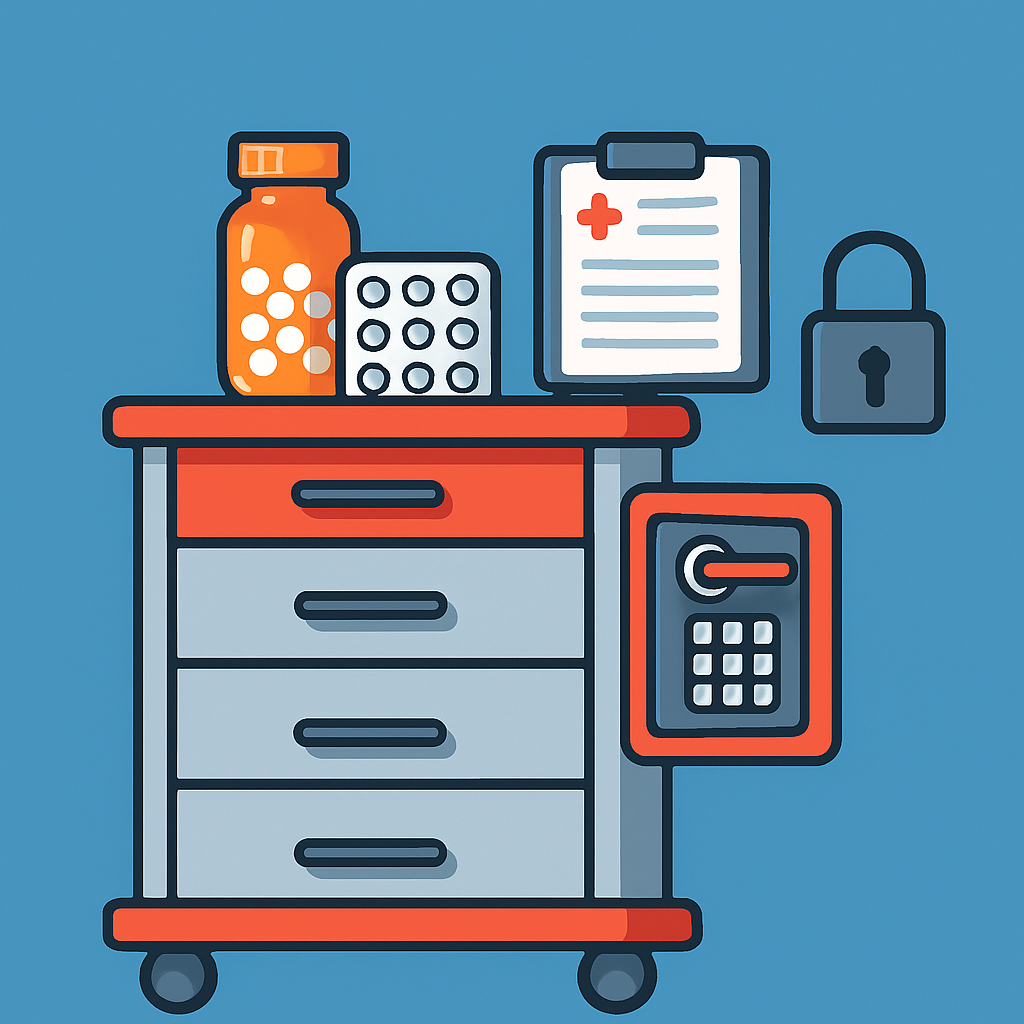
Locks act as the first line of defense. A cart secured with a robust lock system ensures that medications remain available only to those directly involved in patient care. By integrating advanced technologies—such as badge readers tied to hospital credentialing systems or biometric fingerprint scanners—healthcare facilities can further minimize risk. These systems not only restrict access but also provide time-stamped records of who opened the cart, establishing an audit trail that can identify patterns of misuse or suspicious activity.
The peace of mind this provides is critical. Patients and families can trust that medications are handled with the highest degree of security, and staff can be confident that they are practicing in an environment designed to protect both patients and professionals.
Meeting Regulatory and Accreditation Requirements
Narcotic storage is governed by a web of regulatory agencies, including the Drug Enforcement Administration (DEA), state boards of pharmacy, and accrediting bodies such as The Joint Commission. Each requires that controlled substances be stored in locked, secured environments with access restricted to authorized individuals.
Non-compliance is not merely an administrative oversight—it carries real consequences. Healthcare organizations that fail to secure narcotics properly may face significant fines, disciplinary actions, and even loss of accreditation. Additionally, regulatory inspections often occur with little advance notice. Being able to demonstrate secure storage protocols, supported by access logs generated by modern lock systems, provides tangible evidence of compliance and readiness.
Controlled substance locks make this process straightforward. Many electronic lock systems allow for centralized oversight, where pharmacy or security teams can manage user permissions and generate compliance reports at the touch of a button. This reduces administrative workload while ensuring documentation is readily available during audits or investigations.
Promoting Staff Accountability and Protecting Professionals
In addition to compliance, locks on procedure carts support a culture of accountability within the medical team. When each cart access is tied to an individual credential, staff become more mindful of how and when they use narcotics. This transparency discourages inappropriate behavior and protects staff from undue suspicion.
For example, if a discrepancy in narcotic counts arises, access logs can quickly identify who last interacted with the cart and when. This not only deters diversion but also clears staff who may otherwise be wrongly implicated. Controlled substance locks help foster fairness and professional trust by providing a verifiable trail of accountability.
For clinicians, knowing that secure systems are in place allows them to focus more fully on their patients. They can administer narcotics with confidence, free from concerns about misplacement, diversion, or compliance exposure. This reassurance contributes to a more positive work environment, where patient safety and professional integrity are mutually reinforced.
Supporting Clinical Efficiency and Workflow
Critics sometimes worry that adding extra security measures to procedure carts may slow down care delivery, particularly in emergencies. However, modern controlled substance locks are specifically designed to integrate with clinical workflows.
Electronic lock systems can be programmed for rapid access, requiring only a quick badge swipe or fingerprint scan. These actions take seconds—much faster than searching for physical keys that might be misplaced or shared inappropriately. Some systems also allow temporary overrides in emergencies, ensuring critical medications are never delayed when patients need them most.
Centralized control further enhances efficiency. Pharmacy or security departments can update access rights remotely without reconfiguring each cart manually. When a staff member leaves the organization, their access can be revoked instantly, eliminating the risk of unauthorized entry.
In this way, controlled substance locks actively protect and streamline processes. They reduce the likelihood of lost keys, minimize administrative delays, and integrate seamlessly into the digital infrastructure of modern healthcare.
A Strategic Investment in Safety and Trust
While controlled substance locks may represent an upfront investment, their long-term value far outweighs the cost. Consider the potential consequences of failing to secure narcotics: regulatory fines, lawsuits, reputational damage, and most importantly, harm to patients. The financial and ethical implications of a single diversion incident can eclipse the investment in proper security many times over.
Hospitals and surgical centers that adopt robust lock systems signal their commitment to safety and trust. They demonstrate to patients, families, regulators, and staff that narcotics are handled with the highest degree of responsibility. This not only reduces risk but also strengthens the facility’s reputation as a reliable, compliant, and patient-focused organization
Conclusion
Controlled substance locks on procedure carts are far more than mechanical barriers. They are strategic tools that protect patients, ensure regulatory compliance, support staff accountability, and enhance clinical efficiency. By implementing secure, reliable locking systems, healthcare facilities take a proactive stance against diversion while upholding their duty to provide safe, high-quality care.
Ultimately, the true value of these locks lies in the confidence they inspire. Patients can trust their medications are safeguarded, staff can work without fear of suspicion, and administrators can rest assured their facility meets the highest standards of compliance and care. In today’s healthcare environment, where the stakes are higher than ever, controlled substance locks are not optional. They are essential.
Schedule a no-obligation
demonstration where a Waterloo
Healthcare representative will bring a
customizable code cart directly to your
facility for hands-on assessment by
your team.
To arrange your on-site demonstration, please call 800-833-4419 or email CSR@WaterlooHealthcare.com today!

Medical Cart Maintenance 101: Clean Smarter, Not Harder
Healthcare environments require a healthy level of cleanliness and functionality of medical equipment, but it’s not just about appearance. Cleaning carts is a critical component of patient safety and infection control. Medical carts serve as mobile command centers throughout hospitals and clinics, so maintaining a specific cleaning protocol will ensure that they continue performing reliably while meeting healthcare standards.
Healthcare carts are designed for long-lasting functionality. However, proper cleaning techniques can significantly extend their lifespan and maintain their professional experience. That’s why we’ve compiled a list of the right cleaning methods, appropriate products, and potential pitfalls that can help healthcare facilities avoid problems and protect their investments for many years to come.
Waterloo Healthcare Partners with Eleanor Slater Hospital for Enhanced Patient Care
Waterloo Healthcare is proud to partner with Eleanor Slater Hospital in Rhode Island. They have recently deployed a new fleet of code carts, and we are proud to support their commitment to delivering the highest standards of patient care.
Eleanor Slater Hospital operates as a public long-term acute care hospital with campuses in Cranston and Burrillville, serving patients with acute long-term mental illnesses as well as mental health conditions. The hospital’s patient-centered approach focuses on recovery and quality of life, using interdisciplinary care systems that recognize each patient’s unique needs and their right to dignified, high-quality treatment.
This partnership represents our shared commitment to supporting healthcare professionals with reliable, efficient equipment that enhances their ability to provide exceptional care when it matters most.
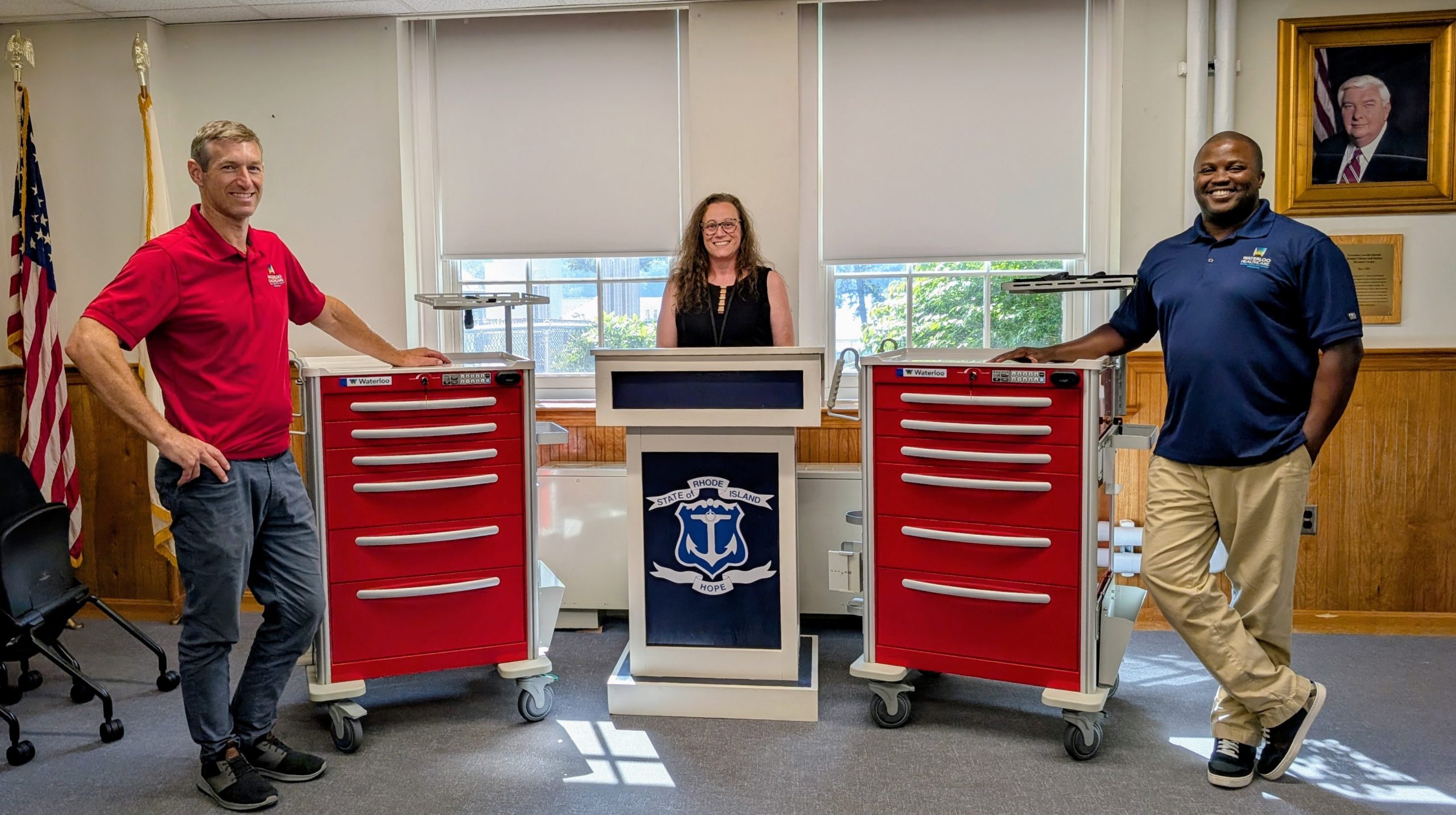
From Crisis to Future Preparedness
Healthcare emergency response has drastically changed over the past several decades, mostly due to the lessons learned from critical incidents, technological advances, and evolving patient care standards.
Healthcare facilities that want to evolve quickly need to understand healthcare’s evolution more fully. Analyzing history gives us a clear view of future challenges that may emerge.
Emergency response protocols are the backbone of healthcare crisis management, and they can quickly determine how effectively medical teams can respond to life-threatening situations. These protocols have evolved through trial and error and continuous improvement based on real-world experiences and evidence-based research.
In this article, we discuss the historical background of healthcare, the rise of emergency response systems, technology integration, modern healthcare practices, and future predictions.
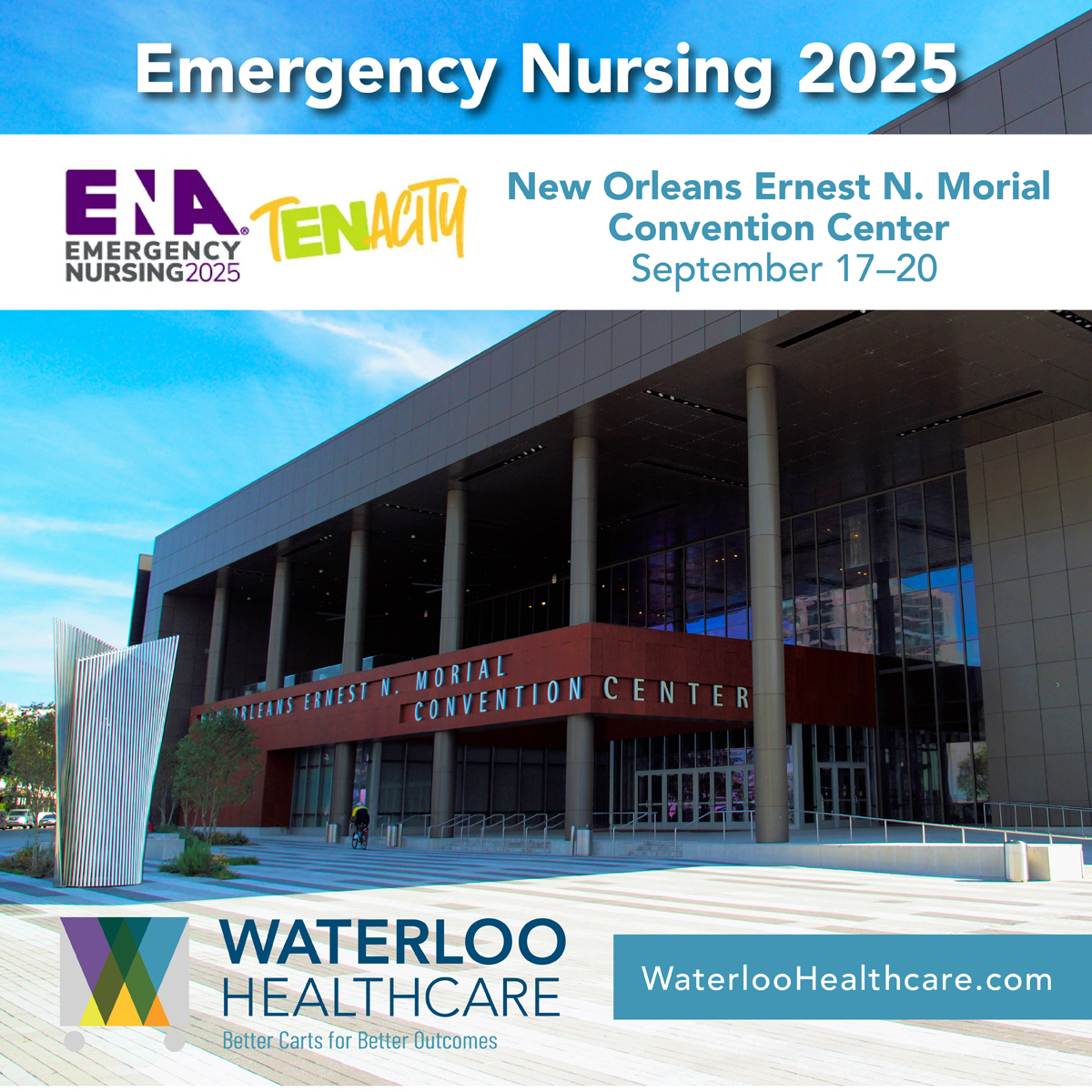
Waterloo Healthcare is headed to New Orleans for Emergency Nursing 2025!
Stop by booth #1425 to see our Aluminum Pediatric Cart (with individual gate locks) and our Aluminum Emergency Code Cart (with the deluxe emergency accessory package). We’ll also be showcasing Electronic Lock Options and more.
Don’t miss our raffle for a RENPHO R4 Pro Massage Gun — a fun bonus while you discover carts built to last a lifetime.
We can’t wait to connect with Emergency Nurses from across the country. See you in New Orleans!
Also, we are going to be in the following fall shows:
- OR Manager, October 28-30 in Anaheim, CA
- North Carolina ENA Conference (Emergency Nurse Association), November 6-7 in Asheville, NC
The sun is now part of the team!
At Waterloo Healthcare, we’re proud to share that our manufacturing operations are now partially powered by solar energy.
This new investment supports our commitment to building durable, clinician-focused carts with a lighter footprint on the planet.
By integrating clean energy into our production process, we’re not just making smart carts – we’re making smart choices for the future!

Waterloo Healthcare is dedicated to providing quality, flexible medical cart solutions that accommodate any clinician’s needs, and our team is always available to help design the cart that’s right for you!

